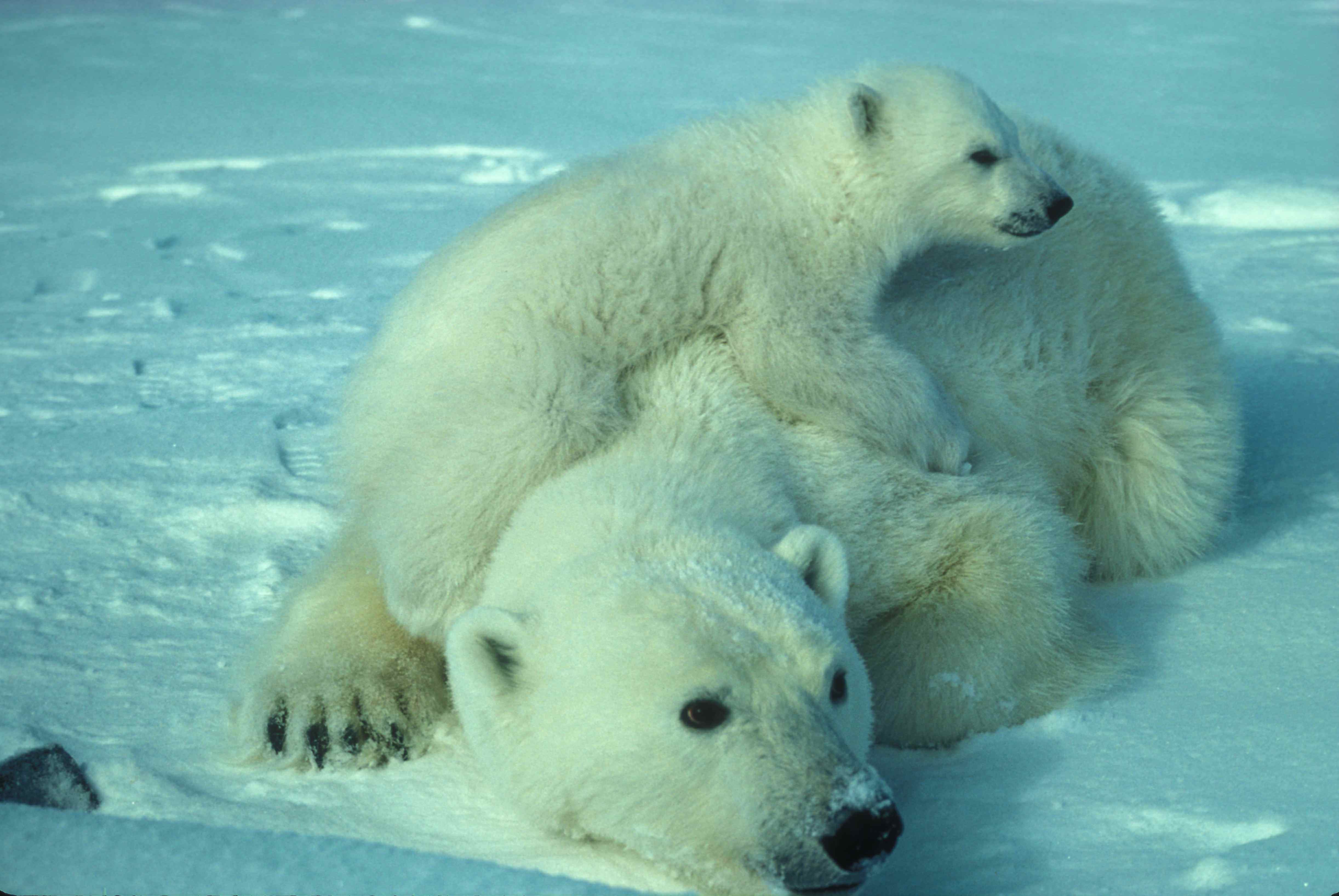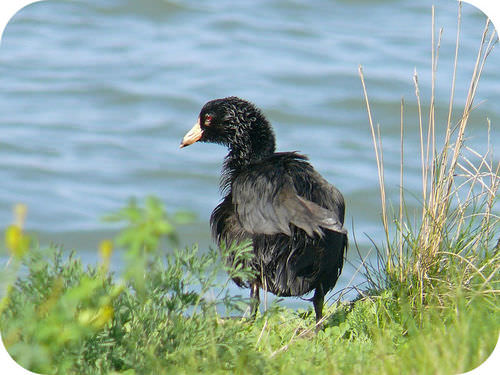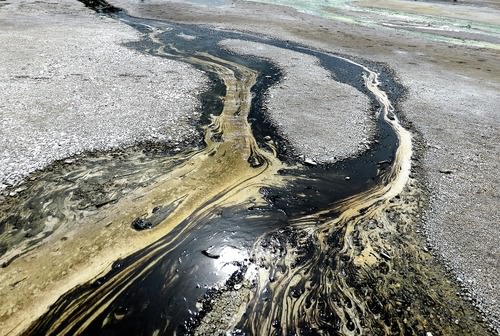大规模灭绝
Section outline
-
Why are these polar bears threatened?
::为什么这些北极熊受到威胁?These polar bears are threatened because of global warming . They depend on the sea ice for their hunting grounds, and this ice is melting away. Plus bears have to make a longer and more hazardous journey to get to the remaining ice.
::这些北极熊由于全球变暖而受到威胁。它们依靠海冰来打猎,而这种冰正在融化。 加上熊,它们必须长途跋涉,更危险,才能到达剩下的冰层。Mass Extinctions
::大规模灭绝An organism goes extinct when all of the members of a species die out and no more members remain. Extinctions are part of . Species often go extinct when their environment changes, and they do not have the traits they need to survive. Only those individuals with the traits needed to live in a changed environment survive (Survival of the Fittest).
::当一个物种的所有成员都死光了,一个生物体就会灭绝。 灭绝是物种的一部分。 当物种的环境发生变化时,物种往往会灭绝,他们没有生存所需的特征。 只有那些具有在变化的环境中生活所需的特征的人才能生存下来(“健康生存 ” ) 。Mass extinctions , such as the extinction of dinosaurs and many marine mammals , happened after major catastrophes such as volcanic eruptions and earthquakes
::大规模灭绝,例如恐龙和许多海洋哺乳动物的灭绝,是在火山爆发和地震等重大灾难之后发生的。Over 99 percent of all species that ever lived on Earth have gone extinct. Five mass extinctions are recorded in the fossil record . They were caused by major geologic and climatic events. Evidence shows that a sixth mass extinction is occurring now. Unlike previous mass extinctions, the sixth extinction is due to human actions.
::地球上所有物种中超过99%已经灭绝,有五种大规模灭绝记录在化石记录中,它们是重大地质和气候事件造成的。证据表明第六种大规模灭绝正在发生。与以往大规模灭绝不同,第六种大规模灭绝是由人类行为造成的。Global Warming
::全球变暖During the past century, the Earth's average temperature has risen by almost 1°C (about 1.3°F). You may not think that is significant, but to organisms that live in the wild and are constantly adapting to their environments, any climate change can be hazardous. Recall that burning fossil fuels releases gasses into the atmosphere that warm the Earth. Our increased use of fossil fuels, such as coal and oil, is changing the Earth’s climate. Any long-term change in the climate can destroy the habitat of a species. Even a brief change in climate may be too stressful for an organism to survive. For example, if the seas increase in temperature, even briefly, it may be too warm for certain types of to reproduce.
::在过去一个世纪里,地球平均温度上升了近1°C(约1.3°F ) 。 你也许认为这并不重要,但对于野生生物和不断适应其环境的生物来说,任何气候变化都可能是危险的。 回顾燃烧化石燃料会将气体排放到温暖地球的大气中。 我们越来越多地使用煤和石油等化石燃料正在改变地球的气候。 任何长期的气候变化都可能摧毁物种的栖息地。 即使是短暂的气候变化也可能会给生物体带来太大的压力,使其无法生存。 比如,如果海洋温度升高,哪怕是短暂的,它可能太热,某些种类的繁殖可能也太难了。Pollution
::污染污染污染Pollution adds chemicals, noise, heat, or even light to an environment. This can have many different harmful effects on all kinds of organisms. For example, the pesticide DDT nearly eliminated the peregrine falcon in some parts of the world. This pesticide caused falcons to lay eggs with thinner shells. As a result, fewer falcon eggs survived to hatching. of peregrine falcons declined rapidly. DDT was then banned in the U.S. and peregrine falcon populations have recovered.
::污染会增加化学品、噪音、热、甚至环境光线,这可能会对各种生物产生许多不同的有害影响,例如,杀虫剂滴滴涕几乎消除了世界上某些地方的游鹰,这种杀虫剂导致猎鹰用薄壳产卵,因此,活到孵化的猎鹰蛋减少,游鹰卵迅速减少,美国随后禁用了滴滴涕,游鹰种群恢复了滴滴涕。threatens vital freshwater and marine resources throughout the world ( Figure ). Specifically, industrial and agricultural chemicals, waste, and acid rain threaten water. As water is essential for all , water pollution can result in the extinction of species.
::具体来说,工业和农业化学品、废物和酸雨威胁到水,水对所有人都至关重要,水污染可能导致物种灭绝。A bird that was the victim of an oil spill. About 58,000 gallons of oil spilled from a South Korea-bound container ship when it struck a tower supporting the San Francisco-Oakland Bay Bridge in dense fog in November, 2007.
::2007年11月,一艘南朝鲜集装箱船在浓雾中撞上一座支持旧金山-奥克兰湾桥的塔塔时,从一艘南朝鲜集装箱船中泄漏了大约58 000加仑石油。Finally, soil contamination can also result in extinction. Soil contamination can come from toxic industrial and municipal wastes ( Figure ), salts from irrigation, and pesticides from . These all degrade the soil as well. As soil is the foundation of ecosystems, this can result in extinction.
::最后,土壤污染还可能导致土壤灭绝,土壤污染可能来自有毒工业和市政废物(图 ) 、 灌溉盐和杀虫剂 。这些都使土壤退化。由于土壤是生态系统的基础,这可能导致土壤灭绝。Soil contamination caused by petrochemical products.
::石化产品造成的土壤污染。Human Overpopulation
::人口超人口Human populations are on the rise. The passed the 7 billion mark in October of 2011, and will pass 8 and 9 billion probably before the middle of the century. All these people will need resources such as places to live, food to eat, and water to drink, and they will use energy and create waste. Essentially, human population growth can effect all other causes of extinction. For example, more people on the Earth means more people contributing to global warming and pollution. More people also means more clearing of land for agriculture and development. Recall that development by humans often causes habitats to be destroyed. This destruction can force species to go extinct, or move somewhere else.
::2011年10月,人类人口正在上升。2011年10月,超过70亿大关,可能在本世纪中叶之前将超过80亿和90亿。所有这些人都需要资源,如生活地点、食物、饮用水、能源、废物等。从根本上说,人口增长可以影响所有其他的灭绝原因。例如,地球上更多的人意味着更多的人促成全球变暖和污染。更多的人还意味着更多的土地用于农业和发展。回顾人类的发展常常导致生境被摧毁。这种破坏会迫使物种灭绝或迁移到别的地方。Science Friday : Can Underwater Parks Protect Coral?
::科学星期五:水下公园能保护珊瑚吗?Coral communities are incredibly important for marine life. In this video by Science Friday , Marine scientists John Bruno and Elizabeth Selig describe the effects of local Marine Protection Areas on preserving coral.
::珊瑚群对海洋生物至关重要。 在科学星期五的这段视频中,海洋科学家约翰·布鲁诺和伊丽莎白·塞利格描述了当地海洋保护区对保护珊瑚的影响。Summary
::摘要-
Extinctions, when a species entirely dies out, can happen when the environment changes, and the organisms do not have the traits they need to survive.
::当物种完全灭绝时,当环境发生变化时,灭绝就会发生,生物没有生存所需的特性。 -
Since life began on Earth, there have been at least five major massive extinctions.
::自地球上的生命开始以来,至少发生了五次大规模大规模灭绝。 -
Evidence shows that a sixth mass extinction is occurring now and is due to human actions.
::证据表明,第六次大规模灭绝正在发生,并且是由于人类行为造成的。 -
Global climate change is a major cause of extinctions.
::全球气候变化是造成灭绝的一个主要原因。 -
Pollution of chemicals, noise, heat, or even light to an environment can be harmful to organisms.
::化学品、噪音、热、甚至环境光线的污染可能对生物有害。
Explore More
::探索更多Use the resource below to answer the questions that follow.
::利用以下资源回答以下问题。-
Causes of Extinction
at
::驱逐的原因和原因,在1990年8月12日至19日
-
What is the primary cause of human-induced extinctions?
::人类引起的灭绝的主要原因是什么? -
What is considered the greatest contributor to the extinction of many species?
::是什么被认为是造成许多物种灭绝的最大原因? -
What was the effect effect of the introduction of mammalian predators to New Zealand?
::新西兰引进哺乳动物食肉动物的效果如何?
Review
::回顾-
Why do species sometimes go extinct?
::为什么物种有时会灭绝? -
What is a mass extinction?
::什么是大规模灭绝? -
Define global warming. Why is global warming an issue to organisms?
::为什么全球变暖是生物的问题? -
How could the high human population growth rate drive further extinctions of plants and animals?
::人口增长率高,如何能导致动植物进一步灭绝? -
Give an example of how pollution can threaten organisms.
::例如,污染如何威胁生物。
-
Extinctions, when a species entirely dies out, can happen when the environment changes, and the organisms do not have the traits they need to survive.


